人教版高一英语必修三 Unit 1 Festivals around the world 语法 课件(共31张PPT)
文档属性
| 名称 | 人教版高一英语必修三 Unit 1 Festivals around the world 语法 课件(共31张PPT) | 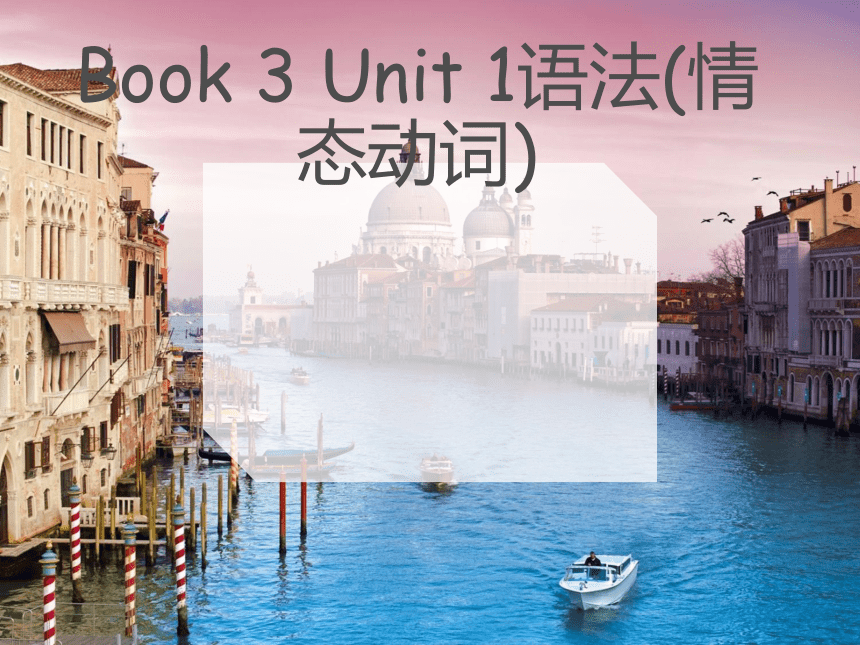 | |
| 格式 | zip | ||
| 文件大小 | 467.7KB | ||
| 资源类型 | 教案 | ||
| 版本资源 | 人教版(新课程标准) | ||
| 科目 | 英语 | ||
| 更新时间 | 2016-08-21 12:35:16 | ||
图片预览

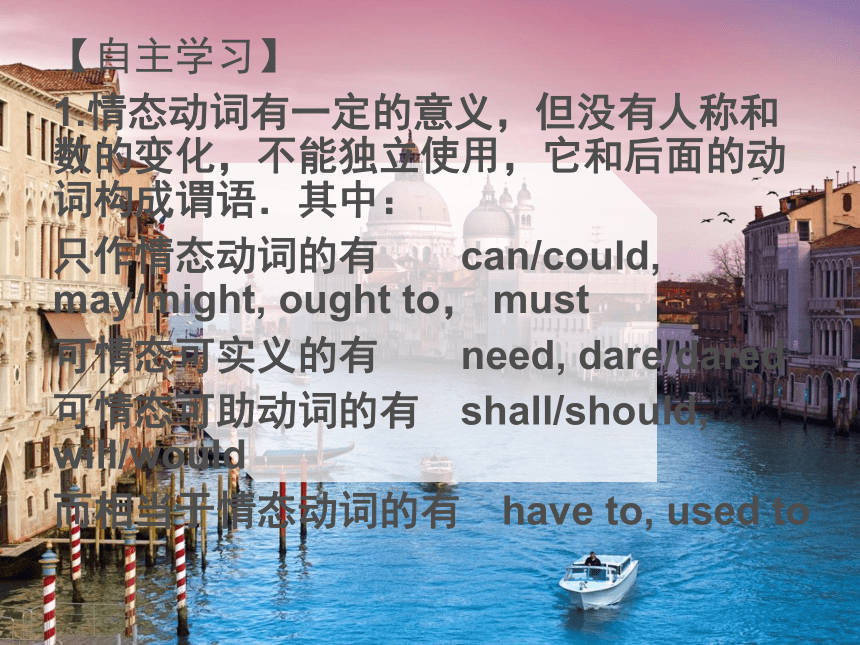
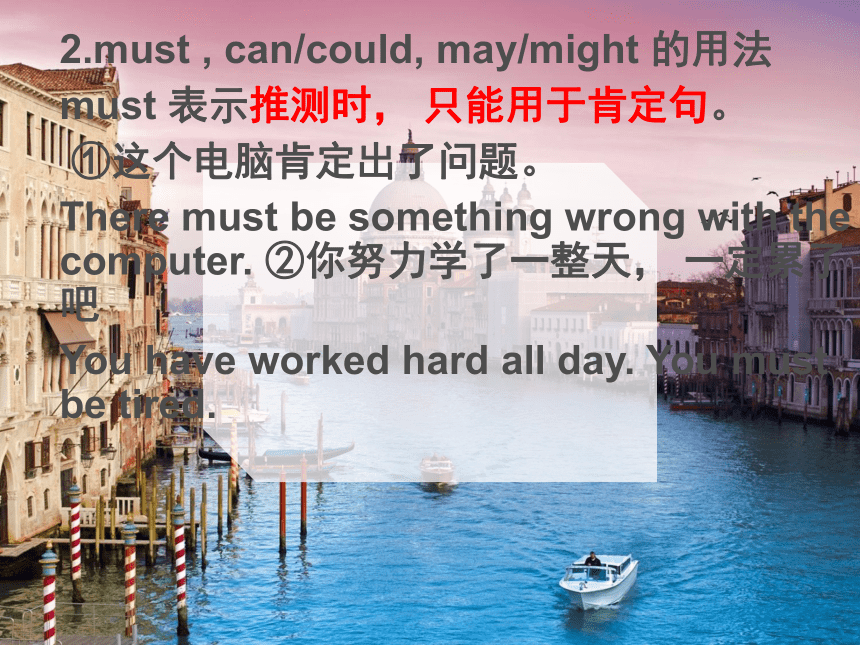
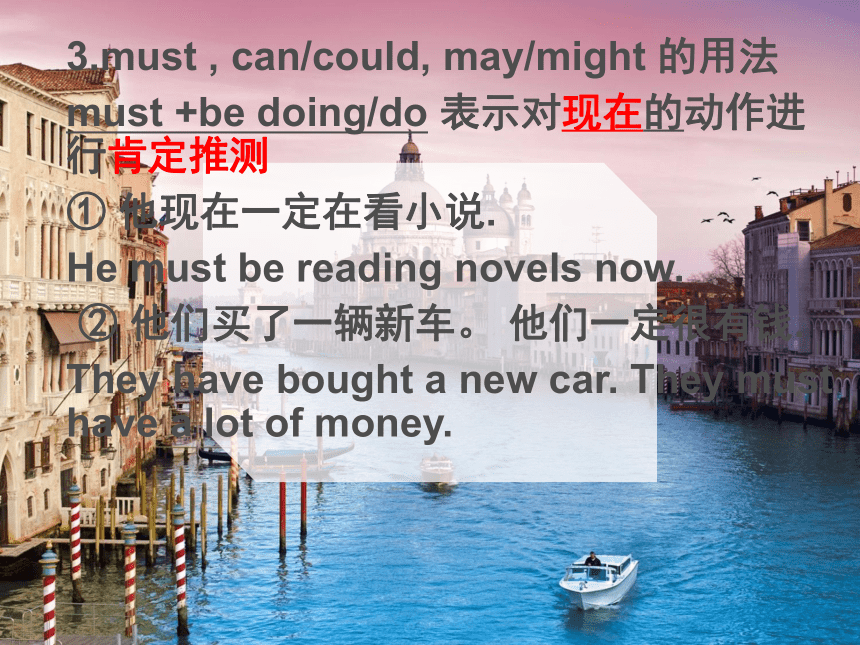
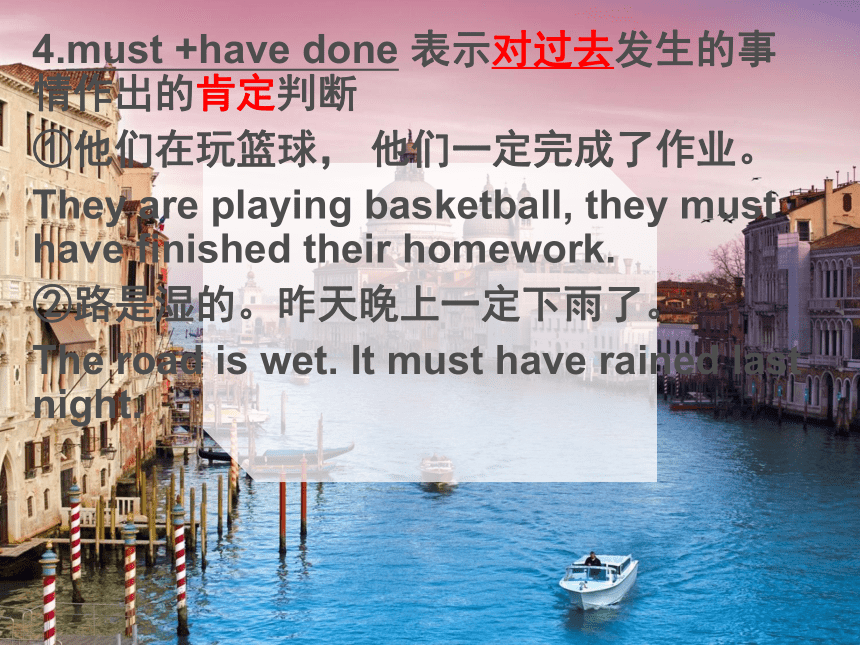
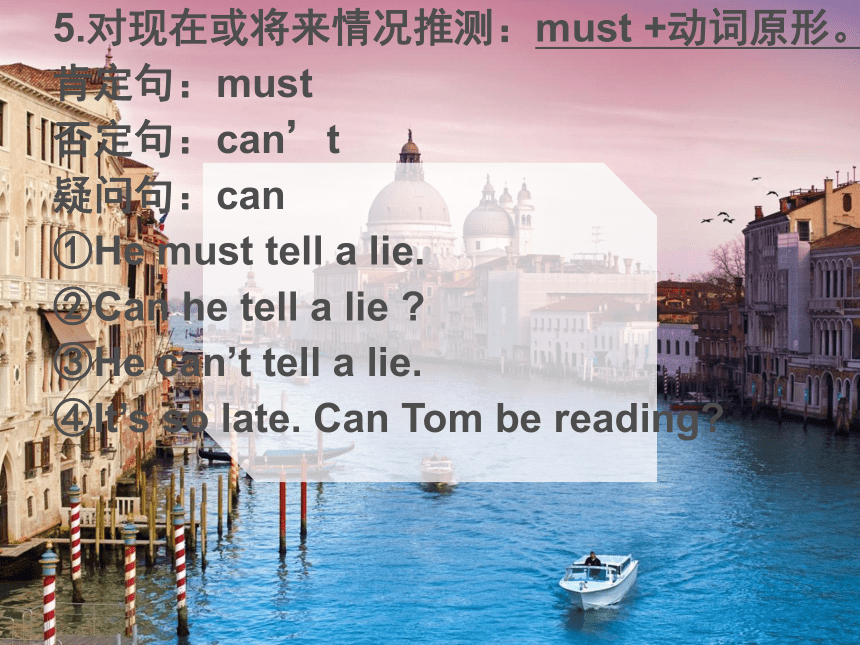
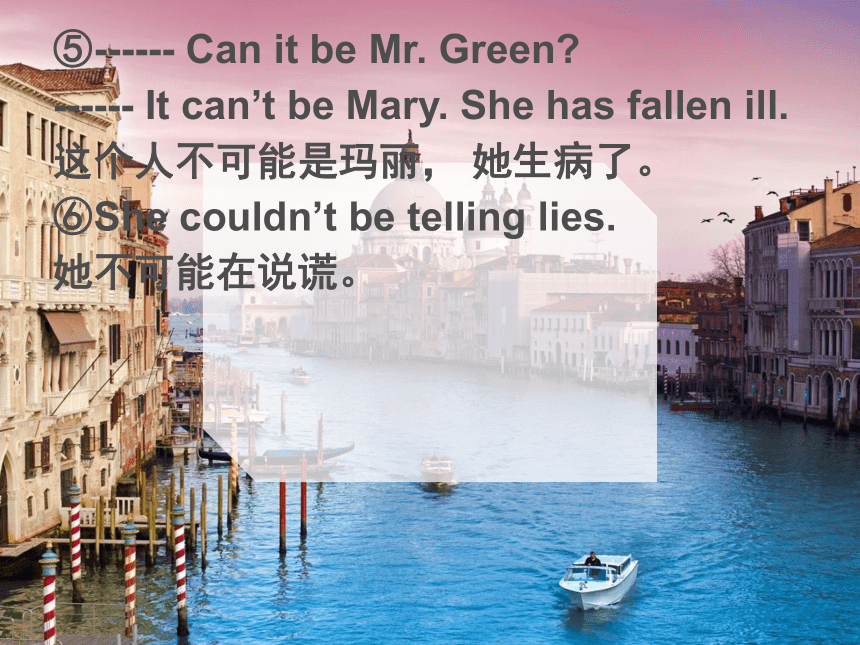
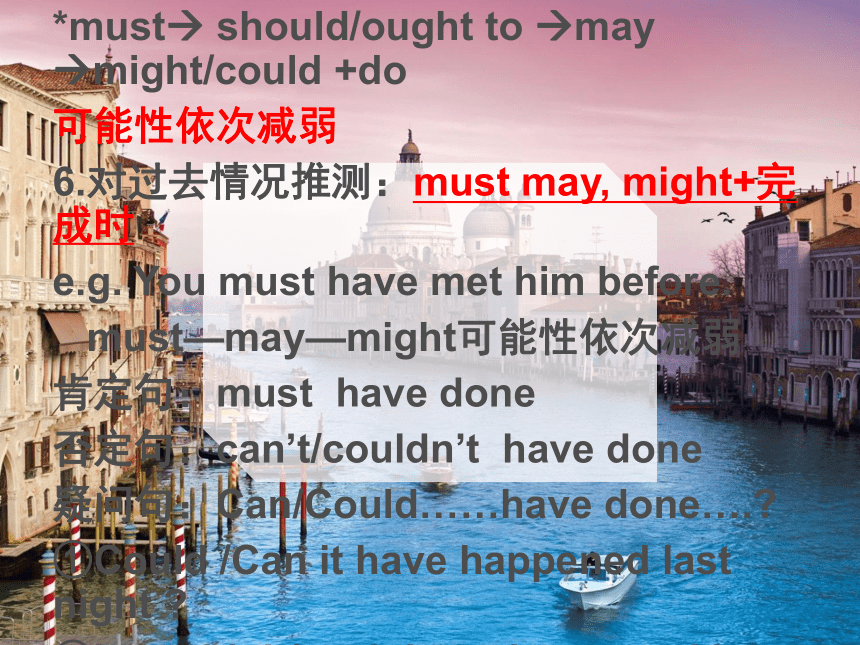
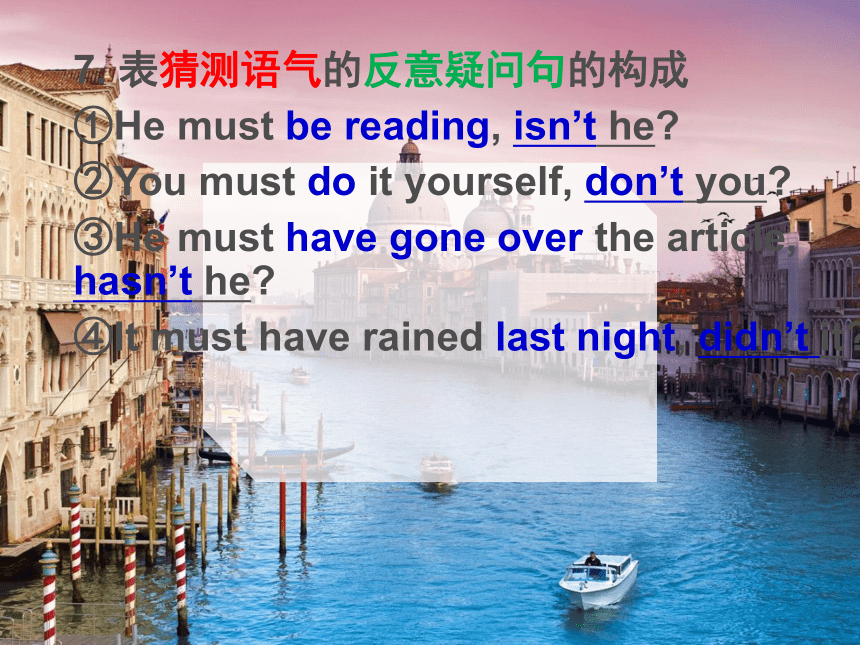
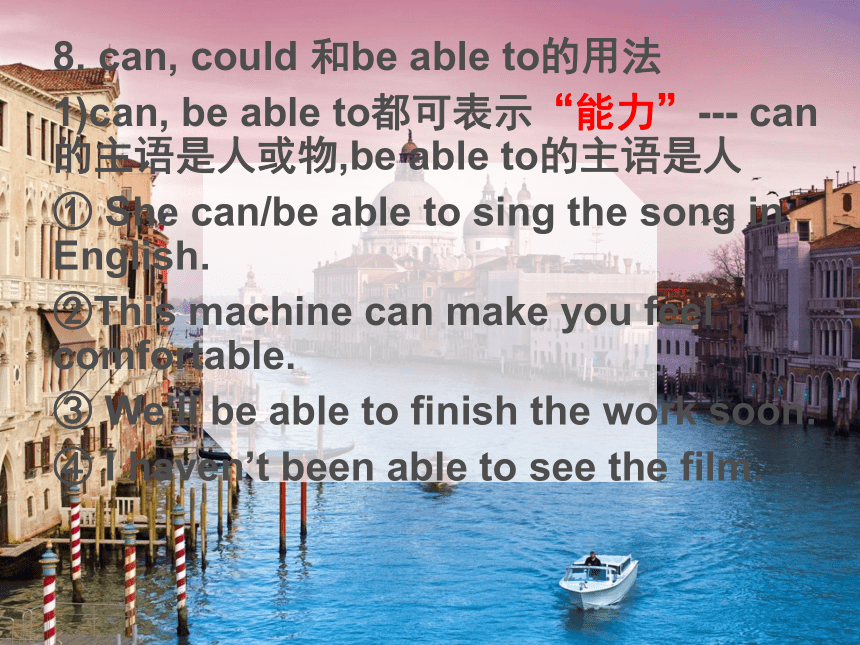
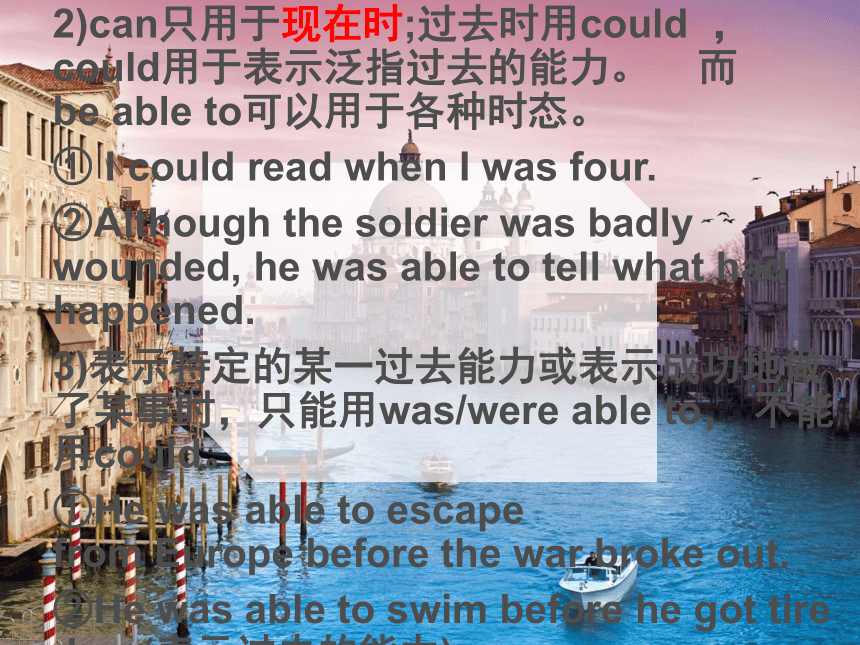
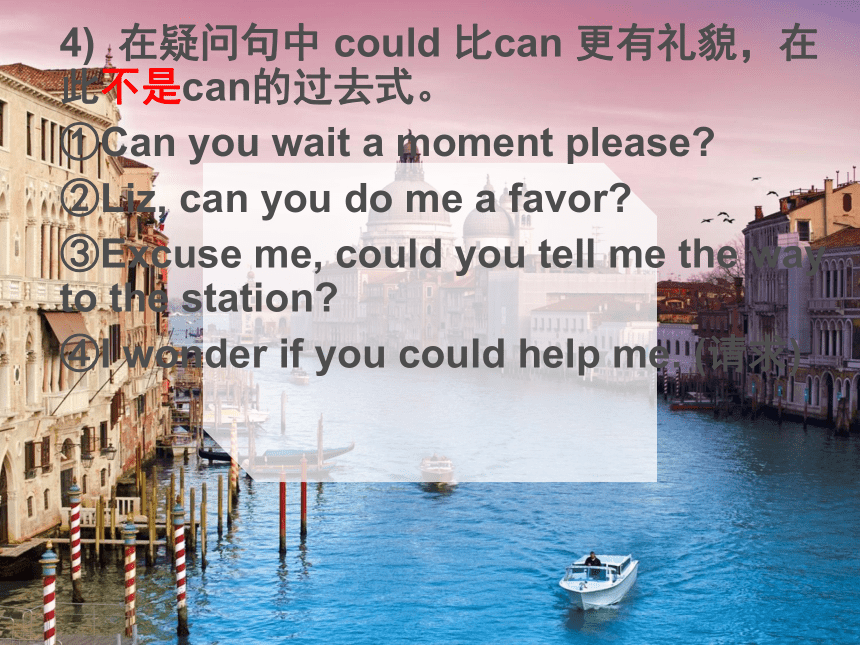
文档简介
课件31张PPT。Book 3 Unit 1语法(情态动词)【自主学习】
1.情态动词有一定的意义,但没有人称和数的变化,不能独立使用,它和后面的动词构成谓语.其中:
只作情态动词的有 can/could, may/might, ought to, must
可情态可实义的有 need, dare/dared
可情态可助动词的有 shall/should, will/would
而相当于情态动词的有 have to, used to
2.must , can/could, may/might 的用法
must 表示推测时, 只能用于肯定句。
①这个电脑肯定出了问题。
There must be something wrong with the computer. ②你努力学了一整天, 一定累了吧
You have worked hard all day. You must be tired.
3.must , can/could, may/might 的用法
must +be doing/do 表示对现在的动作进行肯定推测
① 他现在一定在看小说.
He must be reading novels now.
② 他们买了一辆新车。 他们一定很有钱.
They have bought a new car. They must have a lot of money.
4.must +have done 表示对过去发生的事情作出的肯定判断
①他们在玩篮球, 他们一定完成了作业。
They are playing basketball, they must have finished their homework.
②路是湿的。昨天晚上一定下雨了。
The road is wet. It must have rained last night.
5.对现在或将来情况推测:must +动词原形。
肯定句:must
否定句:can’t
疑问句:can
①He must tell a lie.
②Can he tell a lie ?
③He can’t tell a lie.
④It’s so late. Can Tom be reading?
?
⑤------ Can it be Mr. Green?
------ It can’t be Mary. She has fallen ill.
这个人不可能是玛丽, 她生病了。
⑥She couldn’t be telling lies.
她不可能在说谎。
*must? should/ought to ?may ?might/could +do
可能性依次减弱
6.对过去情况推测:must may, might+完成时
e.g. You must have met him before.
must—may—might可能性依次减弱
肯定句:must have done
否定句:can’t/couldn’t have done
疑问句:Can/Could……have done….?
①Could /Can it have happened last night ?
②It couldn’t/can’t have happened last night.
7. 表猜测语气的反意疑问句的构成
①He must be reading, isn’t he?
②You must do it yourself, don’t you?
③He must have gone over the article, hasn’t he?
④It must have rained last night, didn’t it?
8. can, could 和be able to的用法
1)can, be able to都可表示“能力”--- can的主语是人或物,be able to的主语是人
① She can/be able to sing the song in English.
②This machine can make you feel comfortable.
③ We’ll be able to finish the work soon.
④ I haven’t been able to see the film.
2)can只用于现在时;过去时用could ,could用于表示泛指过去的能力。 而be?able?to可以用于各种时态。
① I?could?read?when?I?was?four.
②Although the soldier was badly wounded, he was able to tell what had happened.
3)表示特定的某一过去能力或表示成功地做了某事时,只能用was/were?able?to,?不能用could。
①He?was?able?to?escape from?Europe?before?the?war?broke?out. ??
②He?was?able?to?swim?before?he?got?tired. (表示过去的能力)
?
4) 在疑问句中 could 比can 更有礼貌,在此不是can的过去式。
①Can you wait a moment please?
②Liz, can you do me a favor?
③Excuse me, could you tell me the way to the station?
④I wonder if you could help me. (请求)
5). can/could have done 对过去发生行为的可能性进行推测:
①刚才我还看见他了, 所以他不可能出国的。
②I saw him just now so he couldn’t have gone abroad. 门是锁着的, 所以她不可能在家。
③The door was locked.
④She couldn’t have been at home.
6) could have done (虚拟语气)“本来可以,本来能够”用于肯定句中,表示对过去发生的事情做出的判断。
你本来可以考得更好。
You could have had a better mark.
9.may/might
may/might表示推测时,只能用于陈述句,表示对现在或将来要发生的动作把握不大。
①她们明天可能会到这里来。
They may come here tomorrow.
② 他们可能还在等我们呢。
They may be still waiting for us.
▲might 可用于指过去的行为或者表示可能性更小
他也许在做功课吧。
He might be doing his homework now.
▲might/may have done,表示对过去发生的动作进行可能性推测。
① He may have gone to the clinic.
他可能去医务室了。
② He might have read about the news in the newspaper.
他可能已经从报纸上知道这个消息了。
10.1)may 表示许可,表示允许别人做某事, 也可征求对方的许可。
May I open the door?
We may keep the book for two weeks.
I asked him if I might leave.
我问他我是否可以离开。
④I asked him “May I leave now?”
2) 用于祈使句,表示祝愿。
May you succeed!
May you have a nice trip!
一. Fill in the blanks with the proper modal verbs and the proper forms of the given words:
1.Peter ___________ come with us tonight, but he isn’t very sure yet.
2.He _____________________(clean) the classroom. It’s really messy.
3.There’s the doorbell. It _________________(be) Robert. He said he would come to pick me up.
4.You ________________ (drink ) it. It is poisonous.
maycan’t have cleanedmust/may bemustn’t/can’t drink5.------ Must I bring all the things with me when I go out for a picnic?
------ No, you ____________. But you __________ bring all the food here.
6.----- Mr. Wang, I will go and fetch four chairs for the meeting.
----- You _____________ fetch four; two will do.
7.You _____________________________________ (not take) the book out of the reading room. Please put them back right now.
8. Is Jack on duty today?
No, he __________________________________. It’s his turn tomorrow.
needn’tmustneedn’toughtn’t to have taken/ shouldn’t have takenisn’t (→He can’t be on duty today.)二、Multiple choice:
( )1. Some people who don’t like to talk much are not necessarily shy; they ___ just be quiet people.
A. must B. may C. should D. would
( )2. One of the few things you ____ say about English people with certainty is that they talk a lot about the weather.
A. need B. must C. should D. can
BD( )3. He did not regret saying what he did but felt that he ___ it differently.
A. could express
B. would express
C. could have expressed
D. must have expressed
( )4. — It’s the office! So you ___ know eating is not allowed here.
— Oh, sorry.
A. must B. will C. may D. need
CA(虚拟语气)( )5. What do you mean, there are only ten tickets? There _______ be twelve.
A. should B. would
C. will D. shall
( )6. I can’t leave. She told me that I _____ stay here until she comes(→came) back.
A. can B. must(→had to) C. will D. may
( )7. He must be helping the old man to water the flowers, _______?
A. is he B. isn’t he
C. must he D. mustn’t he
ABB( )8. It ____ have been Tom that parked the car here, as he is the only one with a car.
A. may B. can C. must D. should
( )9. --Will you go skating with me this winter vacation?
--It _____ .
A. all depended B. all depends
C. is all depended D. is all depending
CB 1. 我不知道她现在在哪里,她可能在武汉。
I don’t know where she is;
____________________.
2. 这时, 我们老师想必在批改试卷。
At this moment, ___________________
_______________________.
she may be in Wuhan our teacher must/may be
marking our exam papers【课后检测】
I. Translation路是湿的,昨晚一定下过雨了。
The road is wet. It ________________ last night.
你妈妈一定一直在找你。
Your mother ______________________ for you.
菲利普可能在车祸中受了重伤.
Philip _________________________ seriously in the car accident.
must have rainedmust have been lookingmay / might have been hurtModal verbs: need(n’t) & must(n’t)1. We have got little time. We _____ hurry.
2. We’ve got plenty of time. We _______ hurry.
3. We have enough food at home so we ______ go shopping today.
4. My father gave me a letter to post. I ______ remember to post it.
5. My father gave me a letter to post. I ______ forget to post it.mustneedn’tneedn’tmustmustn’t6. There’s lots of time for you to make up your mind. You ______ decide now.
7. You _______ wash those potatoes. They’re already been washed.
8. This is a valuable dictionary. You _______ look after it carefully and you _______ lose it.
9. “What sort of house do you want to have? Something big?”
“Well, it ______ be big---that’s not important. But it _____ have a nice garden —that’s essential.”
needn’tneedn’tmustmustn’tneedn’tmustWorkbook
P.42-Ex.1
1.dress up
2. turn up
3. set off
4. took up
5. get off
6. looked up
7.packed up
8. make…up
9. blew up
10. put upWorkbook
P.42-Ex.2
1. obvious
2. sadness
3. agricultural
4. in memory of
5. independence
6. arrival
7. feasts
8. clothingP.42-Ex.3: Translation
1.The photo _____________ her lover (or: beloved) _____________________ at sea, and so she _____. Although she had _____ all her tears _____ when she came out of the room, she could not ____ the ________ on her face.
2.For many years this old man _________ ________ has been dreaming _______ ______ about going back to his ________.
3.The _______ ____ could not find the _______ of the words.reminded her of(who had (been)) drownedweptwipedawayhidesadnesswho lives inMexicoday andnighthomelandenergetic poetorigins4.When we met again, he _________ to me for not having __________________ and asked me to ______ him.
5. __________ experts’ ________, he will win the best actor at the ______ _______ _______ this year.
6. _________________________ he was trying to _____________.
7.If you haven’t got a night parking _________, you can’t ____ your car here.
8.The meeting _________________ next week is ____________ their __________ arrival in the village one hundred years ago.apologizedkept his word/promiseforgiveAccording topredictionGolden RoosterAwardIt was obvious that / Obviouslyhold his breathpermissionparkthat will take placein memory ofancestors’Workbook
P.43-Ex.1
1. can’t (ability),
can’t (guessing)
2. must (guessing)
must (advice/ necessity)
3. May (request), may (possibility)
4. could (possibility), could (promise)
1.情态动词有一定的意义,但没有人称和数的变化,不能独立使用,它和后面的动词构成谓语.其中:
只作情态动词的有 can/could, may/might, ought to, must
可情态可实义的有 need, dare/dared
可情态可助动词的有 shall/should, will/would
而相当于情态动词的有 have to, used to
2.must , can/could, may/might 的用法
must 表示推测时, 只能用于肯定句。
①这个电脑肯定出了问题。
There must be something wrong with the computer. ②你努力学了一整天, 一定累了吧
You have worked hard all day. You must be tired.
3.must , can/could, may/might 的用法
must +be doing/do 表示对现在的动作进行肯定推测
① 他现在一定在看小说.
He must be reading novels now.
② 他们买了一辆新车。 他们一定很有钱.
They have bought a new car. They must have a lot of money.
4.must +have done 表示对过去发生的事情作出的肯定判断
①他们在玩篮球, 他们一定完成了作业。
They are playing basketball, they must have finished their homework.
②路是湿的。昨天晚上一定下雨了。
The road is wet. It must have rained last night.
5.对现在或将来情况推测:must +动词原形。
肯定句:must
否定句:can’t
疑问句:can
①He must tell a lie.
②Can he tell a lie ?
③He can’t tell a lie.
④It’s so late. Can Tom be reading?
?
⑤------ Can it be Mr. Green?
------ It can’t be Mary. She has fallen ill.
这个人不可能是玛丽, 她生病了。
⑥She couldn’t be telling lies.
她不可能在说谎。
*must? should/ought to ?may ?might/could +do
可能性依次减弱
6.对过去情况推测:must may, might+完成时
e.g. You must have met him before.
must—may—might可能性依次减弱
肯定句:must have done
否定句:can’t/couldn’t have done
疑问句:Can/Could……have done….?
①Could /Can it have happened last night ?
②It couldn’t/can’t have happened last night.
7. 表猜测语气的反意疑问句的构成
①He must be reading, isn’t he?
②You must do it yourself, don’t you?
③He must have gone over the article, hasn’t he?
④It must have rained last night, didn’t it?
8. can, could 和be able to的用法
1)can, be able to都可表示“能力”--- can的主语是人或物,be able to的主语是人
① She can/be able to sing the song in English.
②This machine can make you feel comfortable.
③ We’ll be able to finish the work soon.
④ I haven’t been able to see the film.
2)can只用于现在时;过去时用could ,could用于表示泛指过去的能力。 而be?able?to可以用于各种时态。
① I?could?read?when?I?was?four.
②Although the soldier was badly wounded, he was able to tell what had happened.
3)表示特定的某一过去能力或表示成功地做了某事时,只能用was/were?able?to,?不能用could。
①He?was?able?to?escape from?Europe?before?the?war?broke?out. ??
②He?was?able?to?swim?before?he?got?tired. (表示过去的能力)
?
4) 在疑问句中 could 比can 更有礼貌,在此不是can的过去式。
①Can you wait a moment please?
②Liz, can you do me a favor?
③Excuse me, could you tell me the way to the station?
④I wonder if you could help me. (请求)
5). can/could have done 对过去发生行为的可能性进行推测:
①刚才我还看见他了, 所以他不可能出国的。
②I saw him just now so he couldn’t have gone abroad. 门是锁着的, 所以她不可能在家。
③The door was locked.
④She couldn’t have been at home.
6) could have done (虚拟语气)“本来可以,本来能够”用于肯定句中,表示对过去发生的事情做出的判断。
你本来可以考得更好。
You could have had a better mark.
9.may/might
may/might表示推测时,只能用于陈述句,表示对现在或将来要发生的动作把握不大。
①她们明天可能会到这里来。
They may come here tomorrow.
② 他们可能还在等我们呢。
They may be still waiting for us.
▲might 可用于指过去的行为或者表示可能性更小
他也许在做功课吧。
He might be doing his homework now.
▲might/may have done,表示对过去发生的动作进行可能性推测。
① He may have gone to the clinic.
他可能去医务室了。
② He might have read about the news in the newspaper.
他可能已经从报纸上知道这个消息了。
10.1)may 表示许可,表示允许别人做某事, 也可征求对方的许可。
May I open the door?
We may keep the book for two weeks.
I asked him if I might leave.
我问他我是否可以离开。
④I asked him “May I leave now?”
2) 用于祈使句,表示祝愿。
May you succeed!
May you have a nice trip!
一. Fill in the blanks with the proper modal verbs and the proper forms of the given words:
1.Peter ___________ come with us tonight, but he isn’t very sure yet.
2.He _____________________(clean) the classroom. It’s really messy.
3.There’s the doorbell. It _________________(be) Robert. He said he would come to pick me up.
4.You ________________ (drink ) it. It is poisonous.
maycan’t have cleanedmust/may bemustn’t/can’t drink5.------ Must I bring all the things with me when I go out for a picnic?
------ No, you ____________. But you __________ bring all the food here.
6.----- Mr. Wang, I will go and fetch four chairs for the meeting.
----- You _____________ fetch four; two will do.
7.You _____________________________________ (not take) the book out of the reading room. Please put them back right now.
8. Is Jack on duty today?
No, he __________________________________. It’s his turn tomorrow.
needn’tmustneedn’toughtn’t to have taken/ shouldn’t have takenisn’t (→He can’t be on duty today.)二、Multiple choice:
( )1. Some people who don’t like to talk much are not necessarily shy; they ___ just be quiet people.
A. must B. may C. should D. would
( )2. One of the few things you ____ say about English people with certainty is that they talk a lot about the weather.
A. need B. must C. should D. can
BD( )3. He did not regret saying what he did but felt that he ___ it differently.
A. could express
B. would express
C. could have expressed
D. must have expressed
( )4. — It’s the office! So you ___ know eating is not allowed here.
— Oh, sorry.
A. must B. will C. may D. need
CA(虚拟语气)( )5. What do you mean, there are only ten tickets? There _______ be twelve.
A. should B. would
C. will D. shall
( )6. I can’t leave. She told me that I _____ stay here until she comes(→came) back.
A. can B. must(→had to) C. will D. may
( )7. He must be helping the old man to water the flowers, _______?
A. is he B. isn’t he
C. must he D. mustn’t he
ABB( )8. It ____ have been Tom that parked the car here, as he is the only one with a car.
A. may B. can C. must D. should
( )9. --Will you go skating with me this winter vacation?
--It _____ .
A. all depended B. all depends
C. is all depended D. is all depending
CB 1. 我不知道她现在在哪里,她可能在武汉。
I don’t know where she is;
____________________.
2. 这时, 我们老师想必在批改试卷。
At this moment, ___________________
_______________________.
she may be in Wuhan our teacher must/may be
marking our exam papers【课后检测】
I. Translation路是湿的,昨晚一定下过雨了。
The road is wet. It ________________ last night.
你妈妈一定一直在找你。
Your mother ______________________ for you.
菲利普可能在车祸中受了重伤.
Philip _________________________ seriously in the car accident.
must have rainedmust have been lookingmay / might have been hurtModal verbs: need(n’t) & must(n’t)1. We have got little time. We _____ hurry.
2. We’ve got plenty of time. We _______ hurry.
3. We have enough food at home so we ______ go shopping today.
4. My father gave me a letter to post. I ______ remember to post it.
5. My father gave me a letter to post. I ______ forget to post it.mustneedn’tneedn’tmustmustn’t6. There’s lots of time for you to make up your mind. You ______ decide now.
7. You _______ wash those potatoes. They’re already been washed.
8. This is a valuable dictionary. You _______ look after it carefully and you _______ lose it.
9. “What sort of house do you want to have? Something big?”
“Well, it ______ be big---that’s not important. But it _____ have a nice garden —that’s essential.”
needn’tneedn’tmustmustn’tneedn’tmustWorkbook
P.42-Ex.1
1.dress up
2. turn up
3. set off
4. took up
5. get off
6. looked up
7.packed up
8. make…up
9. blew up
10. put upWorkbook
P.42-Ex.2
1. obvious
2. sadness
3. agricultural
4. in memory of
5. independence
6. arrival
7. feasts
8. clothingP.42-Ex.3: Translation
1.The photo _____________ her lover (or: beloved) _____________________ at sea, and so she _____. Although she had _____ all her tears _____ when she came out of the room, she could not ____ the ________ on her face.
2.For many years this old man _________ ________ has been dreaming _______ ______ about going back to his ________.
3.The _______ ____ could not find the _______ of the words.reminded her of(who had (been)) drownedweptwipedawayhidesadnesswho lives inMexicoday andnighthomelandenergetic poetorigins4.When we met again, he _________ to me for not having __________________ and asked me to ______ him.
5. __________ experts’ ________, he will win the best actor at the ______ _______ _______ this year.
6. _________________________ he was trying to _____________.
7.If you haven’t got a night parking _________, you can’t ____ your car here.
8.The meeting _________________ next week is ____________ their __________ arrival in the village one hundred years ago.apologizedkept his word/promiseforgiveAccording topredictionGolden RoosterAwardIt was obvious that / Obviouslyhold his breathpermissionparkthat will take placein memory ofancestors’Workbook
P.43-Ex.1
1. can’t (ability),
can’t (guessing)
2. must (guessing)
must (advice/ necessity)
3. May (request), may (possibility)
4. could (possibility), could (promise)
同课章节目录
